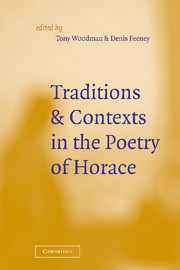Book contents
- Frontmatter
- Contents
- List of contributors
- Prologue
- Acknowledgements
- 1 HORACE'S BIRTHDAY AND DEATHDAY
- 2 AMICVS CERTVS IN RE INCERTA CERNITVR: Epode I
- 3 DREAMING ABOUT QUIRINUS: Horace's Satires and the development of Augustan poetry
- 4 BIFORMIS VATES: the Odes, Catullus and Greek lyric
- 5 THE ODES: just where do you draw the line?
- 6 A WINE-JAR FOR MESSALLA: Carmina 3.21
- 7 FEMININE ENDINGS, LYRIC SEDUCTIONS
- 8 THE UNIQUENESS OF THE CARMEN SAECVLARE AND ITS TRADITION
- 9 SOLVS SAPIENS LIBER EST: recommissioning lyric in Epistles 1
- 10 POETRY, PHILOSOPHY, POLITICS AND PLAY: Epistles 1
- 11 HORACE, CICERO AND AUGUSTUS, OR THE POET STATESMAN AT EPISTLES 2.1.256
- 12 VNA CVM SCRIPTORE MEO: poetry, Principate and the traditions of literary history in the Epistle to Augustus
- 13 EPILOGUE
- Notes
- Abbreviations and bibliography
- Indexes
3 - DREAMING ABOUT QUIRINUS: Horace's Satires and the development of Augustan poetry
Published online by Cambridge University Press: 22 September 2009
- Frontmatter
- Contents
- List of contributors
- Prologue
- Acknowledgements
- 1 HORACE'S BIRTHDAY AND DEATHDAY
- 2 AMICVS CERTVS IN RE INCERTA CERNITVR: Epode I
- 3 DREAMING ABOUT QUIRINUS: Horace's Satires and the development of Augustan poetry
- 4 BIFORMIS VATES: the Odes, Catullus and Greek lyric
- 5 THE ODES: just where do you draw the line?
- 6 A WINE-JAR FOR MESSALLA: Carmina 3.21
- 7 FEMININE ENDINGS, LYRIC SEDUCTIONS
- 8 THE UNIQUENESS OF THE CARMEN SAECVLARE AND ITS TRADITION
- 9 SOLVS SAPIENS LIBER EST: recommissioning lyric in Epistles 1
- 10 POETRY, PHILOSOPHY, POLITICS AND PLAY: Epistles 1
- 11 HORACE, CICERO AND AUGUSTUS, OR THE POET STATESMAN AT EPISTLES 2.1.256
- 12 VNA CVM SCRIPTORE MEO: poetry, Principate and the traditions of literary history in the Epistle to Augustus
- 13 EPILOGUE
- Notes
- Abbreviations and bibliography
- Indexes
Summary
HORACE'S DREAM
At the opening of the final poem of the first book of his Sermones, Horace responds to (probably imaginary) critics who had objected to his criticism of Lucilius for sloppy writing in the fourth Satire. Lucilius deserves praise, he repeats from that poem, for his wit and his attacks on vice: quod sale multo | urbem defricuit (10.3–4). At the same time, however, admirable content does not make a good poem: there is need for constant control of style and tone, something that Lucilius' model (at least according to 1.4), the comic poets of classical Athens, had attained, and for which they deserve imitation (16–17):
illi scripta quibus comoedia prisca uiris est
hoc stabant, hoc sunt imitandi.
But, he continues, neither Hermogenes nor the simius who can only sing along with Calvus and Catullus has ever bothered to read them (17–19):
quos neque pulcher
Hermogenes umquam legit neque simius iste
nil praeter Caluum et doctus cantare Catullum.
At this point, the imaginary interlocutor – presumably the same imaginary person as the one who had criticized Horace for criticizing Lucilius – offers a praise of Lucilius' style (20–1):
at magnum fecit, quod uerbis Graeca Latinis
miscuit.
- Type
- Chapter
- Information
- Traditions and Contexts in the Poetry of Horace , pp. 38 - 52Publisher: Cambridge University PressPrint publication year: 2002
- 19
- Cited by



